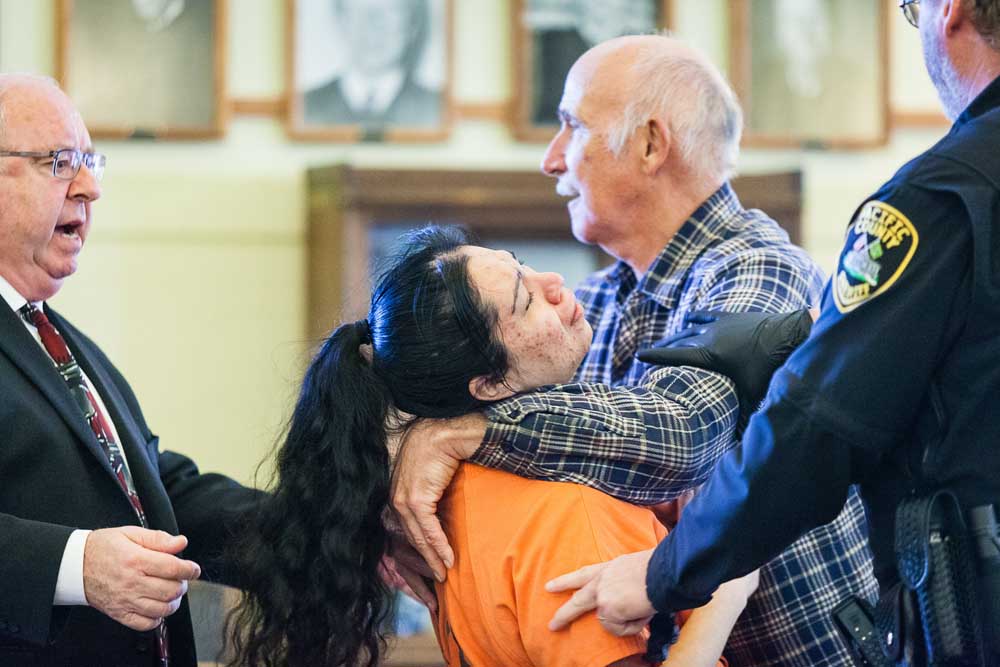Mom ‘not guilty’ in baby’s death
Published 11:27 am Tuesday, December 19, 2017

- Flanked by a corrections officer and court interpreter Pete Hinton, left, Maria Perez Santiago collapsed into the arms of her friend Karl Gunderson, of Raymond. Perez Santaigo on Dec. 13 was acquitted of playing a role in her daughter's 2015 child-abuse-related death.
Editor’s note. This story contains graphic descriptions that may be upsetting to some readers.
SOUTH BEND — For three days, Maria Perez Santiago, 32, tried to keep her composure as witnesses and lawyers discussed her baby girl’s 2015 death in gruesome detail. When Pacific County Superior Court Judge Doug Goelz acquitted her of homicide by abuse, manslaughter and reckless endangerment on the third day of her bench trial, she collapsed in a sudden torrent of tears.
Perez’s trial revealed much about the vast cultural and linguistic gaps between many public servants and Latino immigrants in the county, but did not conclusively answer the central question: Who killed baby Kenya?
In the early hours of Aug. 29, 2015, a volunteer EMT rushed to a house in South Bend. He found 11-month-old Kenya Santiago on the bed that Perez Santiago shared with her partner, Aaron Ayala Silva, 28. She was not breathing and had no pulse.
Rescuers and emergency room staff tried desperately to bring her back, but Kenya had been on a trajectory toward death for about six weeks. By the time anyone realized how sick she was, blood was pooling inside her skull, pressing on her brain.
At Willapa Harbor Hospital, Dr. John Shaw spent 40 minutes trying to resuscitate Kenya before he pronounced her dead. He broke the news to a room full of stunned family members.
The truth about the final weeks of Kenya’s life was evident to Dr. Clifford Nelson, who performed her autopsy. The little girl had 16 rib fractures in different stages of healing. The oldest fractures were about six weeks old. Her internal organs, body and face were bruised. Her tiny ears were torn. Ultimately, however, she died from two skull fractures when someone violently shook her, hit her or slammed her into something.
Child abuse expert Dr. Joyce Gilbert reviewed Nelson’s report. On the stand on Dec. 11, she said Kenya was a victim of “Shaken Baby Syndrome,”or “Abusive Head Trauma.” Gilbert said the most common reason why parents abuse infants is frustration with their crying.
“Shaking makes babies stop crying,’ Gilbert explained. “That unfortunately becomes a reinforcement for shaking.”
Nelson and Gilbert said Kenya would have died quickly after the fatal jolt or blow. Perez Santiago’s son, then six, was in Mexico at the time. If she and Ayala Silva were the only people in the home, Pacific County Prosecutor Mark McClain reasoned, then they were the only ones who could have killed the baby. Perez Santiago and Ayala Silva both insist they never hurt their daughter, and never saw anyone else abuse their child.
In July 2016, Ayala Silva pleaded guilty to homicide by abuse. The next month, he was sentenced to 20 years in prison. However, because there still were so many unanswered questions about Kenya’s death, McClain decided to pursue charges against Perez Santiago, too.
“I thought the community should decide this case,” McClain said.
Authorities took Perez Santiago’s son away after Kenya’s death. South Bend Police arrested Ayala Silva on suspicion of homicide by abuse on Sept. 17. Meanwhile, the grieving mother’s behavior was the subject of intense scrutiny. The EMT said the couple didn’t seem to understand how serious their baby’s condition was. Others thought it odd that when Dr. Shaw informed the family of Kenya’s death, an aunt and frequent babysitter fled sobbing from the emergency room, but Perez Santiago stayed put. A funeral home director said she seemed too casual for someone who was grieving an infant; too eager to put her daughter in the ground. A woman who had known her for years was shocked to find her painting a bedroom a few days after losing both of her children.
Prosecutor McClain believed that as stress from their rocky relationship mounted, Ayala Silva and Perez Santiago took out their frustrations on their baby.
“These parents were beating this baby to death,” McClain said on Dec. 12.
In a 2012 Huffington Post essay, Dr. Kenneth Doka, an expert in hospice care, said ways of expressing grief vary widely from person to person and culture to culture.
“Some cultures expect a dignified and quiet response to loss while in other societies, mourners are expected to openly display their raw emotions,” Doka wrote.
Several of the people who found Perez Santiago’s behavior suspicious didn’t speak Spanish or have much knowledge of Mexican culture, but McClain cited their assessments of her behavior in his trial brief, and called some of them as witnesses.
Perez Santiago was arrested at Ayala Silva’s sentencing hearing. She pleaded not guilty. She spent 17 months in Pacific County Jail before her case went to trial.
Court documents say Perez Santiago had no criminal history, and faithfully took Kenya to her well-baby and nutritional program checkups. The doctors always said the little girl was healthy, and developing normally.
“I just can’t see her hurting that baby,” Raymond resident Karl Gunderson said on Dec. 13. He met Perez Santiago through a neighbor several years ago. In happier times, her son played with his grandson. He thought her a dedicated and loving mother.
He is skeptical of McClain’s theory partly because he saw Perez Santiago capably parent her son during a period of immense grief and stress.
Until a few years ago, Perez Santiago was married to Luis Perez, a deckhand. They bought a home and had a little boy. Then Perez died at sea when the boy was a toddler. The boat owners made certain his wife and child were well-provided-for after his death. But in other ways, Perez Santiago was very alone. She did not have legal status in the U.S., and aside from her former in-laws, she had no family in the area.
Ayala Silva and Perez Santiago met at work. They dated briefly, parted ways, and then reunited. They ended the relationship again, and did not talk until Perez Santiago informed him of her pregnancy.
At first, neither wanted a baby, but Perez Santiago changed her mind. She said she would raise the baby on her own. He was on a family trip to Texas when she gave birth.
For several months, he was not a part of Kenya’s life, but his family persuaded Perez Santiago to bring the baby around for visits. She and Ayala Silva reconciled, and he pressured her to let him into the baby’s life.
When Kenya was about nine months old, he moved in, promising help with childcare and bills. At first he slept on the couch, but after a while, they began sharing a bedroom.
He watched the baby sometimes, Perez Santiago said in court, but it was his sister Liliana Ayala Silva who provided much of Kenya’s childcare.
Two days before she died, Liliana Ayala Silva thought something was seriously wrong. Kenya was usually a happy baby, but on Aug. 26, 2015, she was lethargic. She cried when her aunt touched her head. She had two bumps on her face, and her hair was falling out.
Ayala Silva called Perez Santiago twice to see if she knew what was wrong, then took the baby to her sister-in-law, a nurse, who advised her to go to the emergency room. Kenya’s parents met them there.
Dr. Steven Hill examined Kenya. He provided ointment for a rash behind her ears, and medicine for what he assumed to be a common bug, and told Perez Santiago to take her to the pediatrician.
On Thursday, both parents stayed home with Kenya, who seemed to perk up. Perez Santiago tried to see the pediatrician, but he wasn’t available, so she set an appointment for several days hence.
On Dec. 13, attorneys grilled Perez Santiago about the final hours of her baby’s life.
On Friday Aug. 28, Ayala Silva and a friend barbecued and drank beer. After dinner, the men switched to tequila. It was after midnight when Perez Santiago, who was sober, piled the two men and the baby into the car and drove the friend home.
Back at the house, a tired, frustrated Perez Santiago put Kenya down in the bedroom, and went to the kitchen. Ayala Silva stayed in the dining room, playing music on his computer.
Both parents claim they heard Kenya cry out, although one doctor believes she would not have been capable of crying at that point. Ayala Silva went to check on her, while Perez Santiago prepared a bottle.
A few minutes later, she went in to check on them. Ayala Silva was holding the baby, attempting CPR. Perez Santiago held back tears as she described the scene.
“Her hands were limp,” she said. In her version of events, she asked, “What did you do to the baby?” and tried to take over CPR while Ayala Silva called 911. But soon, she told police, she was so “desperate” that she was banging her head against the wall. While watching the medics, she went into shock.
“I lost it,” she told the court through her interpreter. “When I saw that my baby wasn’t responding, I was just gone.”
Two weeks later, Grays Harbor County Sheriff’s Office Detective Richard Ramirez interviewed Perez Santiago in Spanish. During a two-hour recorded interview, he skillfully tried to coax more information from her.
She told him she had questioned Ayala Silva about the sudden appearance of bruises on the baby’s body the day after their ER visit. Ayala Silva thought it had something to do with her fever. The baby had a history of anemia, which can cause bruising, and she believed Dr. Hill had told her the baby was fine, she said.
“Did you ever think or suspect that somebody hit your child?” Ramirez asked.
“No,” she replied. “Never.”
Perez Santiago might have gotten away with blaming Ayala Silva. Males are more likely to shake their babies, and tend to cause more serious damage than female perpetrators, according to one 2011 study. And he was already under suspicion, because the abuse started around the time he moved in. Instead, she repeatedly insisted she would never have tolerated any form of abuse.
“If I knew Aaron tried to abuse my baby, I would not keep quiet. My children come before him,” she told Ramirez.
Ramirez sent the interview recording to Verbalink, a company that does transcriptions and translations. Verbalink provided two documents: one with side-by-side English and Spanish versions of each question and answer, and a refined, all-English script of the interview.
The first document contains a repeated error that is small, but significant in a case where both parents were suspected of grabbing and squeezing their child. In Mexican Spanish, the verb agarrar means “to grip, grab, or get ahold of,” according to Spandict.com. But Mexicans use the word “grab” to mean “get,” just like Americans do. A mom who says “Can you grab the girl?” doesn’t wish her daughter to be physically assaulted. She wants her to be picked up.
In Perez Santiago’s interview, the transcriber interpreted this word literally, so her account of the baby’s last days is littered with instances where she and Ayala Silva “got a grip on” Kenya.
This was corrected in the all-English document, but a person viewing the bilingual version might have reasonably thought Perez Santiago was consistently rough with her child.
Another frequently mis-translated Spanish word is the verb ‘quejar.’ Literally, it means ‘to complain,’ but also means ‘to fuss.’ In the transcript and during testimony, this word was always interpreted literally, giving the impression that Perez Santiago made numerous references to her baby’s “complaining.”
As McClain, the prosecutor, probed for inconsistencies in her story, he asked Perez Santiago to explain, over and over what happened before she died. It’s very common for speakers of Mexican Spanish to refer to a child as “la niña” or “el niño” — “the girl” or “the boy”. Perez Santiago did this often, making statements like, “I brought the girl in from the car.”
McClain, who does not speak Spanish, was not aware that, while it sounds impersonal in English, it has no negative connotation in Spanish.
“She’s just ‘The Girl’?” McClain asked. “Not Kenya?” Puzzled by McClain’s question, Perez Santiago tried to clarify. “La niña es mi hija” she said — “The girl is my child.”
“There are so many things wrong with this case,” Judge Goelz said at the end of the trial. “I can’t even begin to list the things that are strange.” Between long, pensive silences, he explained how he saw the case.
“I am absolutely certain [Aaron Ayala Silva] is the person who inflicted all the pre-death injuries. No question at all he was the person who abused the child,” Goelz said. But, despite the fact that Ayala Silva refused to leave their home when she asked, he described Perez Santiago’s decision to let him stay on after her baby’s death and son’s removal as “appalling.”
He also pointed out inconsistencies in the statements she made shortly after losing both of her children, and the ones she made in court.
Ultimately though, Goelz said, he didn’t believe McClain had proven Perez Santiago abused, or knowingly allowed Ayala Silva abuse her child.
For several long moments after she was acquitted, Perez Santiago could only sob and gasp for air. Gunderson, the old friend, rushed toward her, and she collapsed into his arms briefly. She found her voice as a guard pulled them apart.
“I want to see my son,” she said, over and over, as the interpreter and guard held her up.
Later that day, she was released from jail, but she is still not free. Immigration officers took her to the Northwest Detention Center, a private for-profit facility in Tacoma. She will likely be deported.





